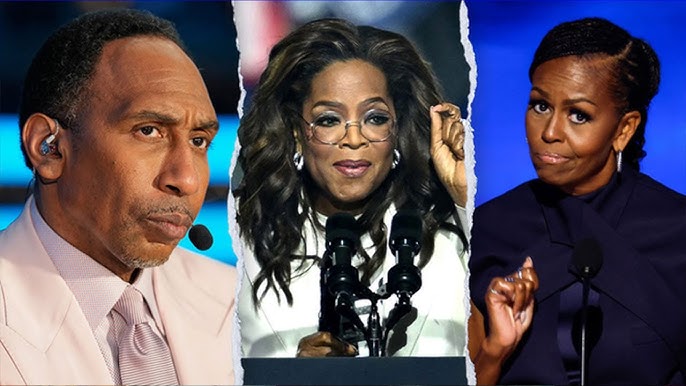In the post-election period, heated debates have arisen over the influence of certain public figures on voter opinions, with ESPN host Stephen A. Smith openly criticizing Michelle Obama and Oprah Winfrey for their involvement in Kamala Harris’s campaign. According to Smith, both Obama and Winfrey alienated voters through statements he believes were divisive and manipulative. Smith, a frequent critic of Donald Trump, argues that Obama and Winfrey’s rhetoric inadvertently created a divide, particularly between men and women, by framing opposition to Harris as an opposition to women in general.
One of Smith’s primary grievances centers around a statement by Michelle Obama, who reportedly told her audience, “a vote for [Trump] is a vote against us.” This comment, Smith contends, sent a message that anyone who didn’t support Harris was automatically opposed to women’s interests. On his podcast, Smith voiced his frustration with this approach, questioning,
“If we don’t agree with you, we’re against you? How do you think men felt about that? So we have to do what you tell us to do; otherwise, we’re anti-you?”
Smith believes this kind of rhetoric disregards how many men might feel and argued that such statements were unlikely to sway those who were on the fence or feeling overlooked.Smith expanded his critique by including Oprah Winfrey, who had reportedly hinted at the dangers of an undemocratic shift in the country if Trump won. For Smith, Winfrey’s remarks were yet another instance of trying to pressure voters morally into supporting Harris. To illustrate his concerns, he played a clip of Winfrey’s comments on his podcast. He argued that these statements, rather than fostering a constructive dialogue, created further polarization, saying, “This is the kind of stuff that alienates an electorate, alienates a voter.” According to Smith, this approach only widened the gap between celebrity elites and the average American citizen, as many voters already felt disconnected from the wealthy influencers speaking on their behalf.
Smith suggests that by framing the election as a moral obligation to vote for Harris, both Obama and Winfrey inadvertently alienated people who felt their own life experiences and struggles were being dismissed. He pointed to pressing issues like inflation and immigration, mentioning that over 12 million people had crossed the border, as reasons why many Americans were likely to be skeptical of celebrity endorsements that seemed out of touch with everyday life.
In discussing this divide, Smith highlighted a key issue he sees between high-profile celebrities and the general public. “In the end,” he remarked, “celebrities who are worth hundreds of millions, if not billions, who most American citizens feel are incredibly detached from their way of life and quality of life, were not going to get away and guilt them into doing something different than what their experience says is going on and what they should do about it.” Smith believes that this detachment only makes it harder for celebrities to connect meaningfully with average voters, who may resent being told how to vote by figures they see as far removed from their day-to-day challenges.
Despite his critiques, Stephen A. Smith is known for avoiding strict political labels. He’s neither firmly conservative nor liberal, which has allowed him to critique both sides. Recently, Smith has gained more visibility in the political sphere, even appearing on conservative commentator Sean Hannity’s Fox News show, where Hannity introduced him as a friend. This shift into political commentary has raised some eyebrows, as Smith is typically recognized for his sports analysis rather than political opinions.
However, Smith’s recent focus on political issues coincides with his ongoing contract negotiations with ESPN. Smith, reportedly earning $12 million a year, is rumored to be seeking a nine-figure deal, which would mark a significant jump in his compensation. He spoke on the Who’s Talking to Chris Wallace show, pointing out his accomplishments in the sports industry. Referencing Dallas Cowboys quarterback Dak Prescott’s recent $240 million contract, Smith argued, “I’ve been number one for 12 years. I’m sorry; in our respective industries, I win, and I’m fully aware of what I’m worth.”
Smith’s growing involvement in political discourse, alongside his demands for a major contract, has led some to speculate about his motivations. However, Smith has remained firm in his views, believing that his commentary reflects the experiences and sentiments of many Americans. His criticisms of Obama and Winfrey appear to come from a place of wanting to defend the autonomy of voters against what he sees as manipulative strategies by high-profile public figures. For Smith, political endorsements from wealthy celebrities can often backfire, particularly when those endorsements seem disconnected from the challenges that regular people face.
Ultimately, Smith’s stance reflects a frustration with the way celebrity influence can sometimes overshadow the complexities of political choice. By calling out the tactics he perceives as alienating, he aims to advocate for a political dialogue that respects individual perspectives rather than imposing a one-size-fits-all moral judgment. As the next election cycle approaches, Smith’s outspoken critique of celebrity involvement may resonate with voters seeking a more nuanced and grounded approach to political influence.



